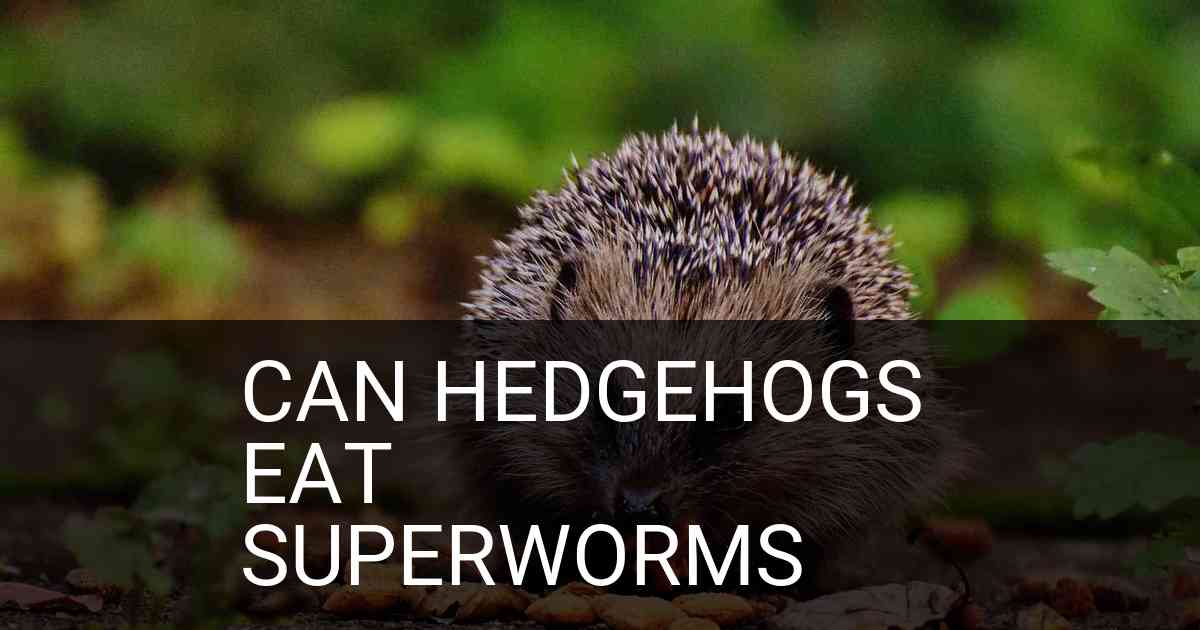
Hedgehogs are some of the most popular exotic pets these days, and they require a special diet to ensure their health. One food item that many owners consider adding to their pet’s diet is superworms. But can hedgehogs really eat superworms safely? In this article, we’ll discuss the pros and cons of feeding your hedgehog superworms, as well as offer advice on how to feed them correctly. Read on for more information about whether or not it is safe for your pet hedgehog to consume superworms!
Can Hedgehogs Eat Superworms?
Yes, hedgehogs can safely eat superworms. Superworms are high in protein and other essential nutrients that make them a great snack for hedgehogs. However, they should only be given as an occasional treat due to their higher fat content.
Benefits of Feeding Superworms to Hedgehogs
- High Protein: Superworms are a valuable source of protein for hedgehogs, which helps keep them strong and healthy.
- Gut Health: The chitin found in the exoskeleton of the superworm is beneficial for gut health.
- Variety: Feeding your pet hedgehog new items like superworms helps provide variety in their diets, which can help prevent boredom with food.
Types of Worms Suitable for Hedgehog Consumption
Hedgehogs are omnivorous animals that require a diet consisting of both meat and vegetables. In the wild, they consume worms, insects, larvae, snails and other invertebrates as part of their diet. If you have pet hedgehogs at home, it is essential to provide them with food that is similar to what they would eat in the wild.
Types of Worms:
- Mealworms: Mealworms are one of the most popular types of worms suitable for hedgehog consumption. They can be purchased in pet stores or online and should be fed to your pet in moderation.
- Earthworms: Earthworms are a great source of protein for hedgehogs and can easily be found outdoors or purchased from bait shops. It is important to make sure you get earthworms that have not been exposed to any chemicals before feeding them to your pet.
- Waxworm: Waxworms are another type of worm suitable for hedgehog consumption. They contain high amounts of fat and should only be fed as an occasional treat in small amounts.
- Red Wrigglers: Red wrigglers are also known as red worms and can be purchased from garden centers or bait shops. They provide a good source of nutrition for hedgehogs but should always be washed thoroughly before feeding them to your pets.
- Superworms: Superworms are larger than mealworms but still relatively small when compared to earthworms. These worms have more nutritional value than mealworms but should also only be given as an occasional treat due to their high fat content.
Pros of Feeding Superworms to Hedgehogs
Superworms are a great food source for hedgehogs because they provide high levels of protein, essential vitamins and minerals. This helps promote healthy growth and development in the animals. Superworms also have a crunchy texture that is attractive to many hedgehog owners. In addition, these worms are relatively inexpensive compared to other live foods available.
One major advantage of superworms over mealworms is that they require less maintenance. They can be stored in a variety of substrates such as soil or sawdust without needing to feed them every day like mealworms do. Furthermore, since superworms don’t pupate into beetles like mealworms do, there’s no need to worry about having unwanted insects living in your home.
Cons of Feeding Superworms to Hedgehogs
The downside of feeding superworms to hedgehogs is that they can be difficult to find in some areas. While they may be cheaper than other live foods, it still might not always be easy to get hold of them if you don’t know where to look. Also, these worms tend to have sharp edges which can sometimes cause injury if fed directly.
Another thing worth noting is that while superworms are generally considered safe for hedgehog consumption when given in moderation, too many could lead to digestive issues from their hard exoskeletons.
Pros of Feeding Meal Worms to Hedgehogs
Mealworms provide similar nutritional benefits as superworms and are equally popular with pet owners. The main advantages over superworms include being easier to get hold of and requiring less maintenance. As mentioned previously, mealworms don’t need to be fed daily like superworms do and can’t transform into insects within the home.
In addition, mealworms are larger than superworms when fed to most hedgehogs, making it much easier for them to eat and digest them. It is also more likely that mealworms will be more appealing to hedgehogs than other live foods due to its size often drawing them to have some. Finally, mealworms are generally cheaper than other live foods which can help make owning some much more affordable.
Cons Of Feeding Meal Worms to Hedgehogs
However, there are risks to feeding mealworms as well such as them being harder to digest due to their hard exoskeletons and sometimes having sharp edges depending on the size of feeder mealworm used. You also have to be aware of where you buy your feeders from as some retailers may sell outdated or moldy product which could affect the health of the hedgehog if consumed.
The Dangers of Inappropriate Hedgehog Food
Hedgehogs are naturally omnivorous, which means they eat both plant and animal material. However, it is important to feed hedgehogs appropriate food in order to ensure their health and well-being. Feeding your pet hedgehog the wrong type of food can have serious consequences.
Common Dangers of Incorrectly Fed Hedgehogs
- Malnutrition: Improper nutrition can lead to deficiencies in vitamins and minerals that can cause physical issues for your pet.
- Dental Issues: Too much soft or processed food can lead to dental problems such as gum disease or tooth decay.
Conclusion
In conclusion, hedgehogs can benefit from a diet that includes superworms. They are a great source of protein and contain essential vitamins and minerals. However, it is important to monitor your hedgehog’s consumption of superworms as they are high in fat and should not be the only food included in their diet.
When feeding your hedgehog large amounts of worms, you should also supplement with other food types such as fruits and veggies to provide them with all the nutrients they need for optimal health. With proper care and nutrition, your pet hedgehog will remain happy and healthy!

